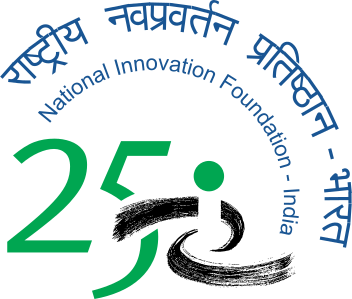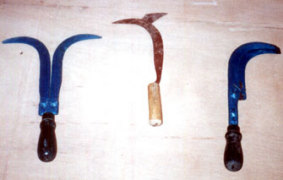Dual purpose Sickles
Kishorebhai Ranchhodbhai Bharadwa (44) is an innovative artisan of Galvav village of Junagadh district, Gujarat. The eldest amongst four brothers he has studied up to the 10th standard. The original profession of his father was making pottery and later on he shifted to carpentry and fabrication work. After his SSC, Kishorbhai got admission in the Industrial Training Institute for a technical course but during the same time his father lost his finger in an accident. Suddenly all the responsibility came on his shoulders and he had to leave his studies. He started manufacturing farm implements such as harrows and ploughs for bullocks and tractors as well as iron grills for doors and windows. Later on his two brothers, who studied up to the 12th and 7th classes, also joined him in the workshop. Kishorebhai has about 23 years experience in repairing and manufacturing farm implements and he is famous for quality work in the surrounding villages. He is married with a son and two daughters. He has a workshop of about 100 sq.yard area and his annual income is about Rs. 25000 to 30,000.
Genesis
Kishorebhai Bharadwa of Junagadh, Gujarat has developed three different types of sickles which can be used for weeding, inter culturing and harvesting. These address the problem of wearing out of blades in sickles due to repeated sharpening.
Kishorebhai and his father are famous in Galavav and neighbouring villages as experts in farm implements. Farmers would often bring their problems concerning their tillers, hoes, ploughs, trailers, etc., to Kishorebhai and would mostly get appropriate solutions. In 1995, a group of people from a nearby village had come to his workshop for some such work. They were quite satisfied with the solution provided by him but before leaving they wondered why it was that Kishorebhai had not come up with any new ideas despite being such an accomplished artisan. Kishorebhai parroted his father's words, "New ideas are for the wealthy and educated folks. When you eke out a hand-to-mouth existence, it is but impossible to innovate.” But Kishorebhai’s customers were not satisfied with this reply and kept on nagging him to come up with some worthwhile idea and bring fame to the area. One common need these farmers approached him with was for getting their grass-shearing knives sharpened; as the shearing blades usually got blunt after cutting grass for a period of between eight to ten hours. This led Kishorebhai to think up an idea for improving the life of the tool between resharpenings. Thus he designed the three types of sickles, which had features to address specific difficulties.
Video | A normal sickle has a long blade with a wooden handle. One has to sharpen the whole blade when it gets blunt. Repetitive sharpening of the blade makes its base thin and one has to discard the sickle and buy a new one, after four to five times of sharpening. To avoid this, the innovator has developed three different types of sickles.
The first type of the improved sickles incorporates two C-shaped, metallic guard plates, with a thin blade sandwiched in between. The blade is fastened in position through screws near the wooden handle. So whenever there is a need to sharpen the blade, the thin blade can be removed and sharpened and then fixed back to the iron base. The user need not rush to the workshop with the blunt sickle.
The second type of sickle is two-sickles-in-one. The two sickles face opposite directions and are joined together at the base near the wooden handle. Kishorebhai avers that this sickle is good for cutting tough grass, silage or hay. Using the right grade of steel, the shaping of the teeth and the edges have been so fashioned that the blades retain their keenness. If the blade on one side gets blunt, the other side can be flipped and used.
The third type of sickle has a concave shaped edge for harvesting crops, while on the top of it; a small pointed metal piece is attached between the sickle and the handle which is used for removing weeds and also to break soil clods.
Advantage
These sickles are multi-purpose and can perform different functions of harvesting, interculturing and weeding. They provide ease of handling and maintenance to the farmer and labourer. Furthermore they are cheaper than the combined costs of conventional tools used for these specific processes. The first model costs Rs.90, the second one Rs. 65 and the third model is priced at Rs.55. The replacement cost of the blades is Rs.15-20.
Relevance
Hand tools are particularly important for small farmers and labourers who can neither afford nor require mechanised implements for farming operations like sowing, ploughing, harvesting, inter-culturing etc. It can easily be seen that even a small improvement in these hand tools can lead to large-scale improvement in productivity or in working conditions across the country. However, de-centralised production and small scale of operation has not allowed these hand tools to undergo notable changes over the years. So it is left to small local artisans and farmers to make innovations in the tools to improve their functioning.
Current status
These improved sickles have had quite a satisfactory reception from the villagers. However, the adoption rate has been extremely slow. Most villagers find the sickles quite useful but the price is beyond their paying capacity as the normal sickle costs only Rs.30. Only three farmers have purchased the improved sickles; the rest come and borrow these sickles from him. Both Kishorebhai and his father Ranchodbhai are quite disillusioned that they are unable to muster adequate financial support to popularise their sickles. They feel that sustaining the innovative spirit needs economic support, which they did not have adequately. Now NIF has sanctioned Kishorebhai Bharadwa a sum of Rs. 8,250 from the Micro Venture Innovation Fund for pilot production and test marketing of these Innovative Sickles.
Currently Kishorebhai is working on developing an innovative refrigerator without using electricity. According to him, the gas currently used in refrigerators is harmful to the environment. Also electricity supply in villages is irregular and therefore the conventional refrigerator is not a viable option. The refrigerator proposed by him claims to also save energy. He also wants to make a santi (poly-cultivator or multi-purpose agro tool bar) that will be drawn by a single bullock. He wishes that the attitude of the government towards artisans would change drastically. Hopefully, his wish will come true one day.








